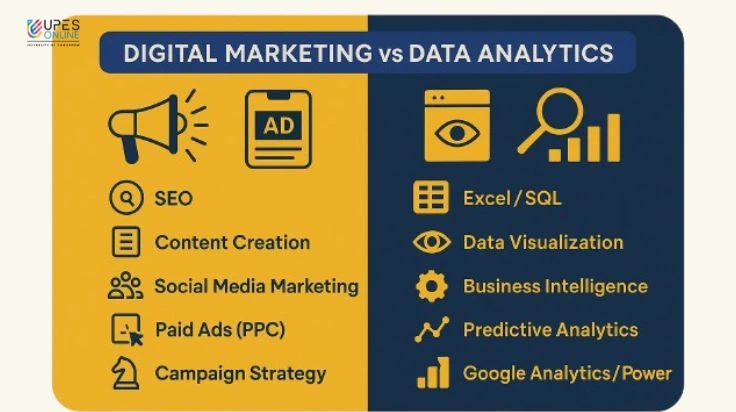BBA Finance Subjects- Core Topics, Specialization, Advanced Concepts

A Bachelor of Business Administration (BBA) in Finance is a versatile and valuable degree that can pave the way to a successful career in the world of finance. Whether you’re a high school graduate exploring your higher education options or someone looking to switch careers, a BBA in Finance can offer you a solid foundation in financial knowledge and open doors to a wide range of opportunities. In this blog, we’ll delve into what a BBA in Finance entails, its benefits, and how it can set you on the path to financial excellence.
FAQ’s
General:
- What is a BBA Finance?
A BBA Finance is a Bachelor of Business Administration program with a focus on financial concepts, including investments, corporate finance, and financial markets.
- Is BBA Finance right for me?
BBA Finance suits individuals interested in finance, data analysis, and careers in banking, investment management, or financial analysis.
- What are the typical courses in a BBA Finance program?
Courses include core business subjects (marketing, accounting) and finance-specific topics like financial accounting, investment analysis, and risk management.
- What are the career options after a BBA Finance?
Graduates can pursue roles in banking, investment management, financial analysis, insurance, and more. Advanced degrees like an MBA open door to leadership positions.
Curriculum:
- What are the math prerequisites for a BBA Finance program?
Strong math skills are essential, with requirements often including algebra, trigonometry, and statistics.
- What software programs will I learn in a BBA Finance program?
You’ll typically learn software like Microsoft Excel, financial modeling tools (e.g., Bloomberg, Capital IQ), and data analysis languages (e.g., Python, R).
- What are the capstone projects or internships like in a BBA Finance program?
Capstone projects apply financial concepts to real-world scenarios, while internships provide practical experience in finance-related organizations.
Admissions:
- What are the typical entrance exam requirements for a BBA Finance program?
Entrance exams like SAT, ACT, or university-specific tests may be needed. Strong academic performance and personal essays are also considered.
- What are the scholarship opportunities available for BBA Finance programs?
Universities offer merit-based and need-based scholarships. Research options and external scholarships for financial support.
- What are the typical admission deadlines for BBA Finance programs?
Deadlines vary, but applications for fall and spring semesters are common. Applying early is advisable for timely consideration.
Career and Future:
- What are the average starting salaries for BBA Finance graduates?
Starting salaries vary by location, industry, and role. Research potential earnings based on your career path.
- What are the highest-paying jobs for BBA Finance graduates?
High-paying roles include investment banking, top-tier financial analyst positions, and hedge fund careers, but they may involve demanding workloads.
- What are the opportunities for further studies after a BBA Finance?
Pursuing an MBA or specialized master’s degree can enhance career prospects and lead to leadership roles.
- What skills do I need for a successful career in finance?
Essential skills include analytical thinking, problem-solving, communication, teamwork, attention to detail, and strong ethical values.
BBA Finance COURSE CURRICULUMN
Sem 1-
- Management & Leadership
- Organizational Behaviour
- Business Economics
- Business Communication
- Business Accounting
Sem 2-
- Financial Management
- Human Resource Management
- Operations & Material Management
- Essentials of Marketing Management
- Strategic Management
Sem 3-
- Research Methodologies for Managers
- Business Computing & IT Applications
- Business Analytics for Managers
- International Business
- Essentials of Entrepreneurship
Sem 4-
- Data Visualization
- Merger Acquisition & Corporate Restructuring
- Investment Banking
- Behavioural Finance
- Marketing of Financial Services
Sem 5-
- Quantitative Techniques
- Business Policy & Strategies
- International Financial Management
- Investment Analysis and Portfolio Management
- Capital Markets and Derivatives
Sem 6-
- Essentials of Logistics & Supply Chain Management
- Financial Risk Management
- Dissertation
Salary Range of BBA Finance Graduates:
- Beginner: ₹3-5 lakhs per annum
- Mid-level: ₹5-10 lakhs per annum
- Experienced: ₹10-20 lakhs per annum
- Senior-level: ₹20+ lakhs per annum
Factors Affecting Salary:
- Industry: Finance, IT, consulting, and e-commerce generally offer higher salaries.
- Company size and reputation: Larger and more established companies typically pay more.
- Location: Metropolitan cities like Delhi, Mumbai, and Bangalore have higher salary ranges.
- Skills and experience: Specialization in areas like investment banking, financial modeling, or risk management can command higher pay.
- Academic qualifications: An MBA or relevant certifications can enhance earning potential.
Additional Tips:
- Network with professionals in the field to gain insights and potential job opportunities.
- Continuously upskill yourself through courses, certifications, and industry knowledge.
- Consider specializing in a niche area to stand out from the competition.
- Negotiate your salary confidently based on your qualifications and experience.
STUDY MATERIAL
Textbooks:
- “Fundamentals of Financial Management” by Brigham and Ehrhardt: This classic textbook provides a comprehensive overview of financial management concepts, including financial analysis, forecasting, capital budgeting, and investment decisions.
- “Investments” by Bodie, Kane, and Marcus: This textbook covers the essential concepts of investment analysis and portfolio management, including asset allocation, risk management, and security valuation.
- “Financial Accounting” by Horngren, Datar, and Rajan: This textbook provides a foundation in accounting principles and financial reporting, which are essential for understanding financial statements and making sound financial decisions.
CHALLENGES
Graduating with a Bachelor of Business Administration (BBA) in Finance is an exciting step towards a rewarding career in the finance industry. However, it’s important to be aware of the challenges that await as you enter the workforce. In this article, we’ll explore some of the key challenges that BBA finance graduates may face and offer actionable insights on how to overcome them.
- Competition in the Finance Industry:
The finance sector is highly competitive, with numerous qualified candidates vying for entry-level positions. To stand out, leverage internships, engage in relevant projects, and emphasize your soft skills, such as communication and teamwork, in your job applications and interviews.
- Lack of Practical Experience:
Fresh graduates often lack practical experience, which employers value. Bridge this gap by seeking internships, volunteering, or working on personal finance projects to gain hands-on experience and build your resume.
- Addressing Technical Skills Gaps:
While your BBA provides a strong foundation, some employers may require specific technical skills, such as data analysis or financial modelling. Consider earning relevant certifications or enrolling in online courses to enhance your skill set and meet industry demands.
- Developing Soft Skills:
Soft skills like communication, problem-solving, and critical thinking are essential for success in finance. Seek opportunities to develop these skills through extracurricular activities, leadership roles, and communication workshops.
- Staying Current with Industry Changes:
The financial landscape evolves rapidly. To remain relevant, engage in continuous learning through professional development, industry publications, and online courses. Staying informed about industry trends and advancements is crucial.
- Finding Your Ideal Career Path:
Finance offers a wide range of career paths, and choosing the right one can be challenging. Research various roles, network with professionals in the field, and conduct informational interviews to identify the best fit for your interests and skills.
- Balancing Work and Life:
Finance can be demanding, potentially affecting work-life balance. To maintain a healthy equilibrium, set clear boundaries, practice self-care, and prioritize your personal well-being. Remember that long-term success requires a sustainable approach.
- Additional Challenges:
External factors like economic conditions and location can pose additional challenges. Be prepared for varying starting salaries, limited job openings, or potential relocation requirements.
To conclude, a Bachelor of Business Administration (BBA) in Finance equips students with a robust foundation in financial principles and practices, preparing them for diverse careers in the finance sector. By blending theoretical knowledge with practical skills, the program fosters analytical thinking, decision-making capabilities, and a deep understanding of financial markets. Graduates emerge as well-rounded professionals ready to tackle challenges in the dynamic world of finance, with opportunities ranging from investment banking to financial planning. The program not only opens doors to lucrative career paths but also instills a lifelong appreciation for the strategic role of finance in business success.
UPES Online Admission Enquiry
Recommended Courses




Latest Blogs

Digital Marketing vs Data Analytics: Which Career Should You Choose?
Battle of skills: Digital Marketing vs Data Analytics—compare 2025 salaries, skills & job roles. Expert tips to choose your future career path!
Read MoreJun 15, 2025 I 12 mins
Why Should I Choose UPES Online? 10 Reasons Why
Explore why UPES Online stands out in online education. Learn about flexible learning, UGC-approved degrees, expert faculty & credible online programs. Enroll now!
Read MoreAug 21, 2025 I 5 min
Can Distance Learning Fully Replace Traditional MBA Education? Challenges & Limitations
Find out if distance learning can truly replace a traditional MBA. Learn key challenges, limitations, expert opinion & insights.
Read MoreSep 2, 2025 I 4 mins
Online MBA Capstone Projects and the Importance They Hold
Know the importance of online MBA capstone projects. Learn how they build real-world skills, boost career opportunities, & add industry value.
Read MoreSep 7, 2025 I 5 mins
UPES Online MBA vs Other Top Universities: Why Students Prefer UPES
Compare UPES Online MBA with other top universities. Know why students prefer UPES online over others. Check fee, flexibility, faculty, ROI, & career scope.
Read MoreOct 1, 2025 I 7 mins






